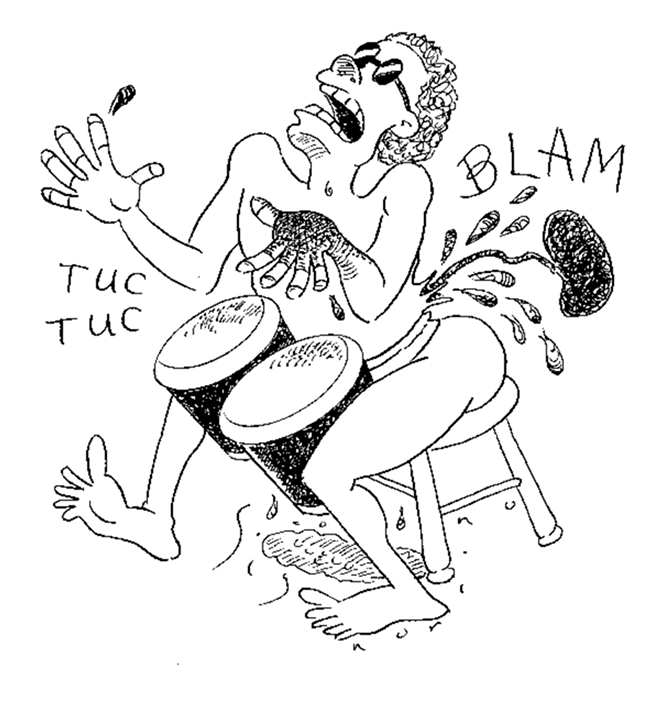I've heard and read stories about musicians, specifically hand drummers, pissing blood after playing a particularly tough or long set. The great Armando Peraza, Santana's longtime bongo and conga player, told an interviewer: "Playing percussion for Carlos you had to be able to play hard, non-stop for sometimes up to three straight hours, and play loud enough to be heard over the electric instruments. A lot of times I played so hard that I would piss blood after the shows. Santana gigs were an endurance test of the highest order." What would the connection be here? Can blood really get into the urine through this kind of physical exertion? —James
Music is a brutal business, James: String and keyboard players can suffer from focal dystonia. Saxophone and clarinet players develop disorders of the temporomandibular joint. At least one guitarist, Terry Balsamo of the metal act Evanescence, apparently gave himself a stroke by head-banging onstage. And hand drummers risk rhabdomyolysis, the disorder you refer to. Typically it's not blood they're seeing in their urine, though — it's muscle.
Rhabdomyolysis occurs when muscle cells are damaged to the extent that they break down in the body, releasing into the bloodstream several substances, including a protein called myoglobin that's excreted in the urine (if you're lucky) and imparts the reddish brown color.
The condition is sometimes called "crush injury syndrome." Some of the first recorded cases were seen during the London blitz in World War II, resulting from the battering people took when they were trapped inside collapsing buildings. It's also found in the victims of earthquakes — after the 1988 Armenian quake more than 1,000 cases were reported — and auto accidents. Some less typical cases have evidently been caused by lightning, centrifugal pilot training, CPR compressions, riding a mechanical bull, being attacked by a wolf, and taking advice from goons. See Springer, B. L., and P. M. Clarkson, "Two Cases of Exertional Rhabdomyolysis Precipitated by Personal Trainers," Medicine & Science in Sports & Exercise, Vol. 35, No. 9, pp. 1499—1502, 2003.)
Not all cases involve trauma, though. The condition is also associated with alcoholism, use of cocaine and other controlled substances, and in rare cases with statins, the ubiquitous drugs used to control cholesterol. Dehydration and abnormally acidic urine seem to make one more susceptible.
Rhabdomyolysis gets serious in about a third of all cases, when the broken-down muscle remnants reach the kidneys in sufficient quantity to block and injure the renal tubules. Kidney damage and sometimes permanent failure can result. Besides the discoloration of urine, symptoms include stiffness, tenderness and weakness of muscles. The overall prognosis is good if you get to the doctor quickly — which is the thing to do in any case of funky-colored urine, given the many bad things it can indicate. (If you think rhabdomyolysis is a drag, you don't want to overlook acute intermittent porphyria.) The doc will likely recommend ceasing the causal activity (duh), increasing hydration (with intravenous liquids containing sodium bicarbonate to make the urine more alkaline), and treatment for kidney failure, including dialysis, if necessary.
Hand drumming is a well-known cause of rhabdomyolysis. A detailed study of Carnaval drummers in Uruguay found that 18 out of 26 turned in abnormal urine specimens after prolonged playing: six samples were rust-colored, and eight contained minute levels of blood, a sign of renal trouble. We recently spoke with one rhabdomyolysis victim, Alan Tauber of the Boston drumming school the DrumConnection, who said he contracted a serious case after several months of intense practice for a performance before the president of Senegal. He had seen the symptoms a few times before, but this time he was much sicker. After two weeks of passing cola-colored urine, he started to experience dizziness and fever and wound up spending five days in the hospital.
"When I grew up in the drumming community," Tauber told us, "blood in your urine was considered to be a rite of passage, and was surrounded with a mystique — that is, when you got it, it meant you knew you had 'arrived,' and the spirit had entered you." Given that Tauber temporarily lost 80 percent of his kidney function, he's probably lucky the spirit didn't exit him.
I would like to know if the end of the world can be predicted? And if so, when will it be? —Zellie
Of course the end of the world can be predicted. Watch this: The world will end next Thursday at four o'clock in the morning. See? Now, if you want an accurate prediction, that's more of a trick. Partly it depends on what you mean by "end." If what you have in mind is physical destruction of the planet, that will occur when the sun explodes, which is too far off for me to get anxious about. If you mean the end of life as we know it ... Zellie, don't you read the news? You'd better get comfortable with the idea that the world has already ended, and we're like cartoon characters who've run off a cliff, a sick grin on our faces, our legs bicycling in the air.
Comments, questions? Take it up with Cecil on the Straight Dope Message Board, straightdope.com, or write him at the Chicago Reader, 11 E. Illinois, Chicago 60611.


